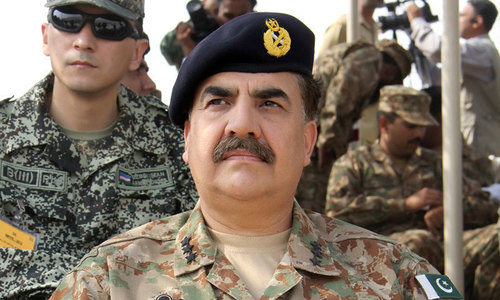WASHINGTON: Army Chief Raheel Sharif crowned his five-day visit to the United States with a meeting with Vice President Joe Biden at the White House on Thursday.
The two leaders met in the Roosevelt Room and discussed “bilateral relations and the security situation” in South Asia, a senior official told journalists.
Although little has so far been disclosed about the nature of discussion, an army chief’s visit to the White House for a meeting with the vice president has its own symbolic importance.
Foreign military chiefs visit Washington regularly, often two or three a week, but not everyone meets the vice president or the secretary of state. Most generals return home after meeting their counterparts. Some also see the defence secretary but meetings with senior political leaders of the US administration are rare.
Also read: US Senators laud Pakistan's anti-terrorism efforts
Sometimes, the visiting generals do go to Capitol Hill to meet US lawmakers but it is also unusual for an army chief to address congressional committees. Yet, Gen Sharif was invited to the Hill on Wednesday afternoon to address two Senate committees, intelligence and armed services.
The two committees issued no statement after these meetings, but DG Inter Services Public Relations Asim Bajwa did send out a series of tweets, giving his version of the proceedings.
According to these tweets, two key members of the Intelligence Committee, Senators Richard Burr and Dianne Feinstein noted that Pakistan Army’s “perseverance and commitment had degraded militancy” in the tribal areas.
They acknowledged that Pakistan had “turned the tide of terrorism’ and assured Gen Sharif of US support and cooperation in eradicating terrorism and extremism.
In his remarks at the committee meeting, Gen Sharif said that terrorism was a global threat, which warranted coordinated global response.
At the Senate Armed Services Committee, he received full protocol and was welcomed by Chairman John McCain, the ranking Democrat, Senator Jack Reed and other senior members.
“Appreciating longstanding Pakistan-US defence cooperation, Senator McCain underlined the need to further reinforce this partnership in view of emerging developments,” Mr Bajwa tweeted.
Senator McCain “appreciated efforts, sacrifices and steadfastness of Pakistani armed forces, especially the army chief’s leadership in fighting terrorists along the Pakistan-Afghan border”, he added.
In his remarks, Gen Sharif explained Pakistan’s perspective on regional security issues and highlighted the need for stepped-up Pakistan-Afghan border management and sustained cooperation to deal with emerging threats, Mr Bajwa said.
In a separate statement, Pentagon Press Secretary Peter Cook said that at Wednesday’s meeting with the army chief, US Defence Secretary Ashton Carter also talked about the Haqqani Network, telling the Pakistani general that the United States ‘feels strongly about the need to go after groups like the Haqqani Network that threaten the United States, threaten, certainly, US forces operating in Afghanistan”.
They both talked about “the need to address that and other groups that posed a threat not only to Afghanistan, but to Pakistan itself”, Mr Cook said.
He said there was no discussion in this meeting on military hardware that Pakistan might need to fight extremists.
Published in Dawn, November 20th, 2015
















































